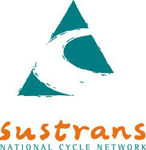|
The Conservative Government launched a National Cycling Strategy in 1996 and this was ratified by the New Labour Government in 1997. The NCS aims to double bicycle use by 2002, and double it again to 10 percent of all journeys by 2012. The Confederation of  British Industry estimates that congestion costs the UK economy up to £20 billion per year. British Industry estimates that congestion costs the UK economy up to £20 billion per year.
National Bike Week, organised by the Cyclists' Touring Club since 1992, attracts a quarter-of-a-million participants each June, and generates £4 million worth of positive press coverage. (In 2000 National Bike Week is called The Millennium Festival of Cycling and is part funded by the Millennium Commission).
 Sustrans the rail-to-trails building charity is aiming to build 5000 miles of continuous cycle route (the National Cycle Network) by June 21st in the year 2000, and complete 9000 miles by 2005. About half will be on traffic-free paths and half on traffic-calmed minor roads. It will be within a 10-minute cycle ride of 23 million people, and will carry nearly 100 million journeys a year. Sustrans the rail-to-trails building charity is aiming to build 5000 miles of continuous cycle route (the National Cycle Network) by June 21st in the year 2000, and complete 9000 miles by 2005. About half will be on traffic-free paths and half on traffic-calmed minor roads. It will be within a 10-minute cycle ride of 23 million people, and will carry nearly 100 million journeys a year.
Sustrans was awarded £42.5m from the Millennium Commission in 1995 although the total cost of the National Cycle Network is estimated at £400m. Almost all new bicycles sold in the UK from 1st January 1997 attracted a levy of 0.25 percent (50p on a £200 bike) and the cash from this goes straight to the National Cycle Network. The cycle industry has to raise £1m for Sustrans in order for the lottery cash to be paid. More than half of this total has been raised to date
The National Byway, originally sponsored to the tune of £500 000 by Hovis (now no longer a sponsor), is a 3000 mile heritage sign-posting project opening fully in the year 2001. It visits 1000 'tourist sites' along the way.
|